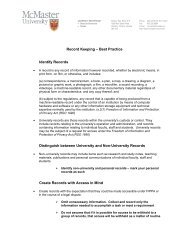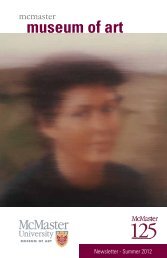Pilgrimage: A Paradigm for Spiritual Formation - McMaster University
Pilgrimage: A Paradigm for Spiritual Formation - McMaster University
Pilgrimage: A Paradigm for Spiritual Formation - McMaster University
You also want an ePaper? Increase the reach of your titles
YUMPU automatically turns print PDFs into web optimized ePapers that Google loves.
ADNAMS <strong>Pilgrimage</strong><br />
155<br />
As Hudson came to see himself as “a pilgrim in daily life,” he<br />
realized that “[e]veryday pilgrims seek to cultivate a particular<br />
attitude toward life—an attitude that sees the living Christ<br />
present in all things, especially in our encounters with those who<br />
suffer.” 62 That attitude, as it becomes increasingly con<strong>for</strong>med to<br />
the image of Christ, is one of caring and compassion. According<br />
to Hudson, 1 Corinthians 13 points out that compassionate caring<br />
“is the distinguishing mark of faithful discipleship” and that this<br />
trans<strong>for</strong>mation to compassionate caring calls <strong>for</strong> “disciplined<br />
ef<strong>for</strong>t and planned co-operation . . . It usually comes as a gracesoaked<br />
gift to those who intentionally, consciously, and regularly<br />
place themselves be<strong>for</strong>e God.” 63 Psalm 84:5–8 captures these<br />
observations and reflects the core characteristic of “illumination”<br />
as “a radical shift of the deep dynamics of our being, a profound<br />
trans<strong>for</strong>mation of our relationship with God . . . the experience of<br />
total consecration to God in love.” 64<br />
Nonetheless, when a person is in the depths of liminality, at<br />
times the pilgrimage can become overwhelming. This may<br />
require what David James Duncan calls “strategic withdrawal: to<br />
step back, now and then, from the possible to take rest in the<br />
impossible: to stand without trajectory in the godgiven weather<br />
till the soul’s identity begins to come with the weathering.”<br />
Feasibly, Christ might impose his strategic withdrawal on us, by<br />
leading us into a dark night of the soul in order to reveal himself<br />
in unparalleled ways, or to accomplish his deeper, mysterious,<br />
trans<strong>for</strong>ming work within us. Alternatively, we ourselves may<br />
recognize that we need an intentional period of rest and reflection.<br />
Either way, these seasons of stasis should be embraced as<br />
integral parts of the pilgrimage of spiritual <strong>for</strong>mation that will, in<br />
God’s time, lead to our anastasis/exanastasis.<br />
Although “travel” comprises a large part of the pilgrimage of<br />
spiritual <strong>for</strong>mation, it can be said that within the time and space<br />
of travel, there are many seasons of preparation and departure;<br />
62. Hudson, Mile in My Shoes, 23.<br />
63. Ibid., 24.<br />
64. Mulholland, Invitation to a Journey, 94.<br />
65. Duncan, “Strategic Withdrawal,” 14.<br />
65
















